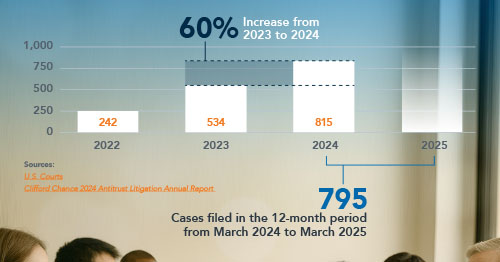
Biden’s First 100 Days: A New Regulatory Forecast
April 28, 2021
By:
What the administration’s early actions can spell for dynamic changes in regulation and compliance.
On day one of his administration, President Biden got off to a bold start by signing more than a dozen executive orders on subjects ranging from student loans to deportation — including a freeze on all regulatory actions in process under the prior administration.
In the subsequent 99 days, more orders, executive appointments, nominations, and legislative activities have contributed to a notable thaw in the regulatory sphere as the administration strives to fulfill the policy-driven promises made during the campaign. A recent Corporate Compliance Insights article suggests that companies “should look to bolster their compliance infrastructure ahead of this imminent wave of regulation,” an activity that legal departments would surely applaud.
Although the full impact of activities from the first 100 days may not play out for some time, the combination of COVID-19 fallout and the actions of the new administration — especially the appointments of some agency leaders — is already beginning to change business, legal, and compliance dynamics. Many companies are already facing increased litigation and fraud investigations as a result of the pandemic with the expectation that incidents will rise; the potential for increased regulatory actions from agencies energized by new leadership will only intensify the need for a corporate response.
Energized regulatory agencies with a consumer protection focus
A more robust regulatory environment is expected under the Biden administration, especially for financial and monetary systems, with a greater focus on consumer protection. With Gary Gensler heading up the SEC, there will likely be an emphasis implementing regulatory measures or approaches to broaden the retail investor focus. The Federal Reserve Board will resume examination activities for all banks after previously announcing a reduced focus on exam activity in light of the coronavirus response. And, with Janet Yellen at the helm of the Treasury, there will likely be stepped-up enforcement and investigatory activities on several fronts, including a shoring up of the Dodd-Frank act, which was relaxed under the prior administration, and implementation of the Corporate Transparency Act to expose and combat money-laundering, which Yellen has said is “one of her highest priorities.”
Rohit Chopra, awaiting confirmation as head of the Consumer Financial Protection Bureau, is also expected to play a role in increasing regulatory actions, reversing the prior administration’s more lax oversight and enforcement policies. Already, analysts say, bank examinations, student lending, subprime auto loans, debt collection, mortgage services, and payday loans are expected to come under renewed scrutiny.
The M&A landscape is in flux, impacted substantially by the pandemic but now gaining renewed momentum. Due to COVID-19 and its impact on the economy, the DOJ and FTC have been on alert for antitrust violations. According to at least one major law firm’s assessment, there is likely to be increased antitrust enforcement by the DOJ in several key industries over the next several years including tech, health care, and agriculture as well as increased merger enforcement that will lead to more second requests and potential for litigation.
Also affecting M&A activity is a possible increase in the capital gains tax that could spur even more activity ahead of its passage. The pending confirmation of Lina Kahn as a commissioner of the FTC marks the probability of greater investigative efforts to potentially break up the expanding reach of Big Tech. Google, Facebook, Microsoft, and Apple will be the most likely targets, but expanded investigations related to M&A in other industries are also probable. The healthcare and pharmaceutical industries, whose activities stand out in high relief due to the pandemic, are sure to face more scrutiny in terms of both monopoly pricing issues and market concentration, which Biden says he will aggressively tackle.
The 100-day message? Be proactive and be prepared.
One thing seems certain: the regulatory landscape will continue to be dynamic. The first 100 days is, after all, just the beginning. Increasing litigation and investigations, second requests, and the due diligence and regulatory reporting necessitated by just the few probable changes suggested above threaten to impact the workload of most corporate legal and compliance departments, which may already be overburdened and understaffed.
The possibility of such activity is best met with well-prepared legal and compliance functions and a laser focus on corporate data, with the appropriate tools to manage it. Any proactive steps taken to ensure that the appropriate workflows are in place should stand companies in good stead, accelerating any necessary response and mitigating the costly effects of poorly handled document productions. Companies with teams at the ready to meet these data-heavy challenges will be in a much better position to respond quickly and efficiently should the need arise.







.jpg)
